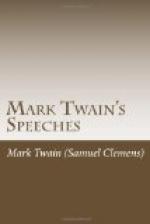Then, lamenting, she brought a grave accusation against their little son. She said: “He has been saying his Aunt Mary is a fool and his Aunt Martha is a damned fool.” Mr. Fiske reflected upon the matter a minute, then said: “Oh, well, it’s about the distinction I should make between them myself.”
Mr. Washington, I beg you to convey these teachings to your great and prosperous and most beneficent educational institution, and add them to the prodigal mental and moral riches wherewith you equip your fortunate proteges for the struggle of life.
TAMMANY AND CROKER
Mr. Clemens made his debut as a campaign orator on October 7, 1901, advocating the election of Seth Low for Mayor, not as a Republican, but as a member of the “Acorns,” which he described as a “third party having no political affiliation, but was concerned only in the selection of the best candidates and the best member.”
Great Britain had a Tammany and a Croker a good while ago. This Tammany was in India, and it began its career with the spread of the English dominion after the Battle of Plassey. Its first boss was Clive, a sufficiently crooked person sometimes, but straight as a yard stick when compared with the corkscrew crookedness of the second boss, Warren Hastings.
That old-time Tammany was the East India Company’s government, and had its headquarters at Calcutta. Ostensibly it consisted of a Great Council of four persons, of whom one was the Governor-General, Warren Hastings; really it consisted of one person—Warren Hastings; for by usurpation he concentrated all authority in himself and governed the country like an autocrat.
Ostensibly the Court of Directors, sitting in London and representing the vast interests of the stockholders, was supreme in authority over the Calcutta Great Council, whose membership it appointed and removed at pleasure, whose policies it dictated, and to whom it conveyed its will in the form of sovereign commands; but whenever it suited Hastings, he ignored even that august body’s authority and conducted the mighty affairs of the British Empire in India to suit his own notions.
At his mercy was the daily bread of every official, every trader, every clerk, every civil servant, big and little, in the whole huge India Company’s machine, and the man who hazarded his bread by any failure of subserviency to the boss lost it.
Now then, let the supreme masters of British India, the giant corporation of the India Company of London, stand for the voters of the city of New York; let the Great Council of Calcutta stand for Tammany; let the corrupt and money-grubbing great hive of serfs which served under the Indian Tammany’s rod stand for New York Tammany’s serfs; let Warren Hastings stand for Richard Croker, and it seems to me that the parallel is exact and complete. And so let us be properly grateful and thank God and our good luck that we didn’t invent Tammany.




